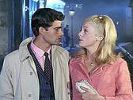Eye For Film >> Movies >> The Umbrellas Of Cherbourg (1964) Film Review
Clearly created as an homage to the MGM musicals of the Fifties, The Umbrellas Of Cherbourg remains unusually modern with it's acceptance that life ain't like the movies. Writer/director Jaques Demy eliminates all non-singing dialogue and allows the lyrics to be more a reflection of reality than anything the average Hollywood product would dare.
Catherine Deneuve is Genevieve, the teenage assistant in her mother's brolly shop in Cherbourg (a very rainy place indeed), who falls for Guy, a garage mechanic (Nino Castelnuoco). Genevieve's mother isn't over the moon about this pairing and is only too delighted when Guy is called up for his military service in Algeria. She sets about match-making Genevieve with a suave diamond dealer Roland Cassard (Marc Michel), whom she hopes will solve her financial worries, as well as securing a respectable life for the family, little realising that Genevieve is expecting Guy's baby.

This may sound like the perfect set-up for a soap opera, but what makes the film stand out, apart from the fact that it is a musical, is its reluctance to go all the way with the melodrama. There are endless moments where everything could have become romantically selfish and depressing, a la Romeo and Juliet, but to Demy's great credit he keeps the characters real and reassuringly weak, forcing them into acceptable, if undesirable, compromises. Ironically, it is this understatement that makes the movie all the more involving and emotionally charged.
The most striking part, though, is the extravagant score by Michel Legrand. The mind boggles as to how you compose for a film like this, since it's not a case of occasional staged numbers, but a continuous flow of music, suited to voices of ordinary actors, discussing subjects such as teenage pregnancy, car repairs and that ultimate dream of opening one's own petrol station!
Legrand manages brilliantly, with ample sweeping strings and dramatic flourishes, so that the story makes total sense, even when you stop reading the subtitles. If the music poses a problem, then the transition between scenes is potentially even more troublesome, but Demy and cinematographer Jean Rabier keep things fluid, giving the film a narrative style all of its own.
Leading a talented cast is a very young Deneuve, who shines throughout with flirtatious girlish wonderment, transforming visibly into profound sorrow, as she is forced into a marriage of convenience. Castelnuovo similarly makes the transition from carefree lad to troubled ex-solidior with grace. Given the timespan of the film - eight years - slotted into less than an hour and a half, it is this believability that forms the backbone of a simple story.
Reviewed on: 31 Aug 2001


















